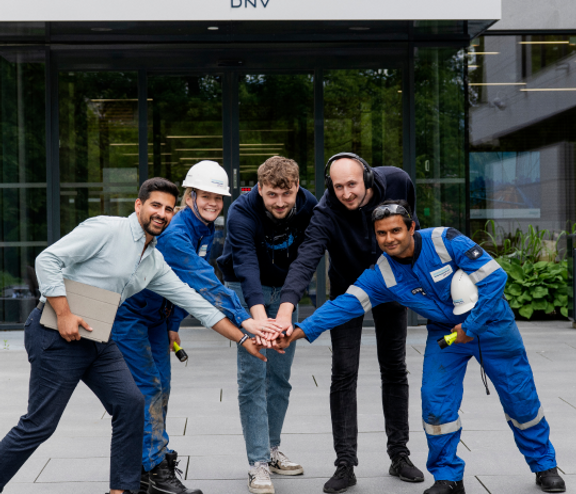
Remote surveys
By using an online or video link to the vessel, our dedicated remote surveyors can support vessels anywhere in the world.

We are the independent expert in assurance and risk management. Driven by our purpose, to safeguard life, property, and the environment, we empower our customers and their stakeholders with facts and reliable insights so that critical decisions can be made with confidence.
As a trusted voice for many of the world’s most successful organizations, we use our knowledge to advance safety and performance, set industry benchmarks, and inspire and invent solutions to tackle global transformations.
DNV, Maritime Advisory Singapore is a growing consulting and Research & Innovation unit overseeing activities in Region Southeast Asia, Pacific and India. DNV ambition is to be a data-smart solutions organization providing management and technical advisory services within the maritime industry, focusing on Maritime Decarbonization, Digital Transformation and Sustainability. Our key stakeholders include charterers and cargo owners, asset owners for ships and mobile offshore units, maritime authorities/government entities and defence, banks/investment/leasing companies with interest on maritime assets and infrastructure, LNG suppliers and traders, and maritime technology providers and the digital eco-system/start-ups.
We are seeking candidates to support our team of experienced maritime consultants in advisory projects and leading-edge Research and Innovation activities, including the use of new technologies in the maritime sector such as autonomous and zero-emission vessels, and data platform/data analytics. The selected individuals can expect to work in a dynamic, high performing team with diverse technical and management background, nationalities and experience, leveraging on DNV global network, accelerated learning curve and working on exciting projects with meaningful impact to the clients’ organization and wider maritime industry.
As an intern, you will be part of an experienced and diverse team conducting consulting work such as techno-commercial feasibility studies and market assessments, research & innovation activities or delivering customized solutions to our clients in Singapore and within the region, covering all elements of analysis and capability improvement projects leveraging on Digitalization, Automation and Big Data Analytics. There will be significant learning opportunities for the selected candidates as the role will involve engaging our clients and external stakeholders, interviewing and brainstorming activities with DNV experts located in Singapore and our other research and advisory hubs such as in Norway and Germany, and other forms of activities involving desktop learning, reviewing of research papers and publications.
Interns can also anticipate the opportunity to undertake their Capstone Projects in various areas, including but not limited to the following:
Energy Efficiency Measures/Alternative Fuel: The project should include but not be limited to understanding and applying knowledge to use various measures to enhance energy efficiency on board different vessels and using alternate fuels in the maritime industry. Multiple factors related to an appropriate selection of technologies and alternate fuels must be explored using methodologies such as current reports, literature reviews, interviews with various stakeholders, and data analysis. The analysis must be industry-relevant and potentially valuable for the maritime industry as an applied solution. You are expected to work closely within and outside DNV as per the project's demand.
Decarbonization and digitalization: Decarbonization and digitalisation are currently the most transformative forces in the shipping industry, and these two topics are deeply intertwined. Digitalisation is often seen as the linchpin enabling decarbonisation across various industry aspects. The project scopes include but are not limited to, extracting and processing data from various public domains and external/internal databases, as well as developing dashboards for data visualisation purposes. Depending on project needs, you will have the opportunity to learn and use various data extraction, processing, and visualisation tools such as Excel, Power BI, and Databricks. Beyond acquiring technical knowledge in digitalisation, you are also expected to gain exposure in the maritime and shipping industry, particularly on decarbonisation, sustainability, digital transformation, etc. Depending on project needs, this role requires coordination and communication with colleagues and industry partners.
ESG and Sustainability: Interns in the maritime industry can contribute to various sustainability projects, such as analysing carbon emissions from shipping operations and proposing reduction strategies like alternative fuels. They can also develop sustainability reporting frameworks aligned with global standards, conduct life cycle assessments of vessels, and benchmark ESG practices against industry leaders. Additional projects include creating sustainable procurement strategies and evaluating the impact of IMO regulations on ESG strategies. Interns can explore circular economy practices in shipbuilding, develop stakeholder engagement plans for ESG initiatives, and enhance port sustainability by reducing emissions, energy use, and waste. These projects provide practical experience in ESG strategy, data analysis, and sustainability efforts.
Position Qualifications
The right candidates will have the following background/requirements:
Our work helps pioneering companies and covers latest trends, regulations, initiatives to develop solutions to the most complex challenges the maritime industry is facing.
Please note, benefits may depend on your contract type, please confirm with your recruiter.

At DNV, our commitment to Diversity, Equity, and Inclusion is not only an ethical choice, but also a business decision.
Diversity, fairness, and a sense of belonging are a source of strength for our people, our business, and our customers, and help us to deliver on our purpose, vision, and values.
Learn more
Since 1864 we’ve been dedicated to safeguarding life, property and the environment. Today we remain at the forefront of new technologies and techniques to help our customers transform for a more sustainable future.
At DNV you can expect to deliver career and industry defining work. You’ll be given the time to build your network, the resources to support your development, and the freedom to satisfy your curiosity and desire to learn.
Learn moreWelcome to our Frequently Asked Questions page. We’ve put together answers to the questions we’re asked most often to help you find the information you need quickly and easily. Whether you're curious about our recruitment process, benefits or career growth and development, you should find the information below.
Can't find the right fit?
Be the first one to learn about new job opportunities that might be a perfect fit for you.
JoinPlease beware of recruitment scams that pretend to be from DNV or its employees. We will never ask you to pay any fees or make any payments as part of our recruitment process.